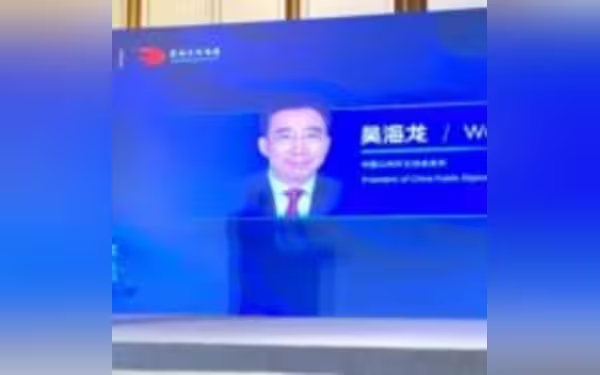Saturday, November 16, 2024 07:43 PM
Wu Hailong: US Restrictions Fail to Impede China's Economic Growth
- US restrictions spur China's technological innovation.
- China's semiconductor industry thrives despite US pressure.
- Huawei leads smartphone market amid US challenges.
 Image Credits: pakistantoday
Image Credits: pakistantodayWu Hailong asserts US restrictions are ineffective, fueling China's economic and technological advancements.
In recent years, the geopolitical landscape has shifted dramatically, with the United States and its allies increasingly viewing international relations through a lens of competition. This mindset has led to rising tensions and conflicts across the globe. A prominent voice in this discussion is Wu Hailong, a former Chinese envoy, who recently shared his insights at the 8th Taihe Civilizations Forum. He argues that the technological restrictions imposed by the U.S. and its allies are not only ineffective but have also inadvertently spurred China’s economic growth and technological advancements.
Wu Hailong pointed out that U.S. Deputy Secretary of State Kurt M. Campbell has labeled China as the greatest challenge in U.S. history. This perspective, according to Wu, reflects a Cold War mentality that is counterproductive to America’s long-term interests. He stated, "Despite the economic and technological restrictions imposed by the United States and its Western allies, which are driven by geopolitical motivations, these actions have not hindered China’s progress. Instead, they have become catalysts for China’s technological innovation." This assertion highlights a significant shift in how restrictions are perceived; rather than stifling growth, they may be fostering resilience and creativity.
One of the most notable examples of this resilience is in the semiconductor industry. The U.S. has attempted to limit China’s access to advanced lithography machines, crucial for chip production. However, recent announcements from China’s Ministry of Industry and Information Technology reveal that the country has developed its own lithography machines. Furthermore, China’s chip exports have skyrocketed, surpassing 500 billion yuan in the first half of the year, marking a 26% increase from the previous year. Wu emphasized, "This demonstrates that U.S. pressure has not hindered the development of China’s semiconductor industry; rather, it has accelerated China’s independent research and development in this crucial area."
In the telecommunications sector, Huawei has emerged as the leading smartphone vendor in China, despite facing significant restrictions from the U.S. This success story is indicative of the broader trend within China’s digital economy, which is one of the fastest-growing sectors globally. Additionally, China has made remarkable strides in the new energy vehicle market, capturing a 68% share of the global market. Its photovoltaic industry has consistently ranked first in production worldwide, playing a vital role in global green energy initiatives.
Wu Hailong also addressed the implications of U.S. policies on American companies. He noted, "The U.S. containment policy towards China has a double-edged effect, particularly on American companies." A recent report highlighted concerns from California Democrats who urged the Biden administration to reconsider new technology export restrictions to China, warning that such measures could jeopardize longstanding U.S. companies. Wu pointed out that the challenges faced by the U.S. are largely self-inflicted, stating, "Shifting harm on others will not resolve its own issues."
As U.S. economic strategist David Goldman aptly noted, "No matter what obstacles are placed in front of China, it will rise to the challenge and overcome them." This sentiment underscores the resilience of nations in the face of adversity. Wu concluded with a thought-provoking reflection: "When the United States seeks to undermine others today, it may face dire consequences tomorrow." This statement serves as a reminder that pursuing gains at the expense of others can lead to unforeseen repercussions.
The ongoing technological restrictions imposed by the U.S. may not yield the intended results. Instead, they could be fostering a stronger, more innovative China. As the world becomes increasingly interconnected, it is essential for nations to recognize that cooperation and mutual benefit are the keys to true peace and development. The path forward lies not in competition but in collaboration, where all nations can thrive together.













